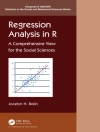This book traces the theoretical explanation for clusters back to the work of classical economists and their more modern disciples, who saw economic development as a process involving serious imbalances in the exploitation of resources. Initially, natural resource endowments explained the formation of nineteenth and early twentieth-century industrial districts. Today, geographical concentrations of scientific and creative knowledge are the key resource. But these require a support system, ranging from major injections of basic research funding, to varieties of financial investment and management, tothe provision of specialist incubators, for economic value to be realised. These are also specialised forms of knowledge that contribute to a serious imbalance in the distribution of economic opportunity.
Philip Cooke
Knowledge Economies [PDF ebook]
Clusters, Learning and Cooperative Advantage
Knowledge Economies [PDF ebook]
Clusters, Learning and Cooperative Advantage
Köp den här e-boken och få 1 till GRATIS!
Språk Engelska ● Formatera PDF ● Sidor 240 ● ISBN 9780203445402 ● Utgivare Taylor and Francis ● Publicerad 2002 ● Nedladdningsbara 6 gånger ● Valuta EUR ● ID 2291682 ● Kopieringsskydd Adobe DRM
Kräver en DRM-kapabel e-läsare












